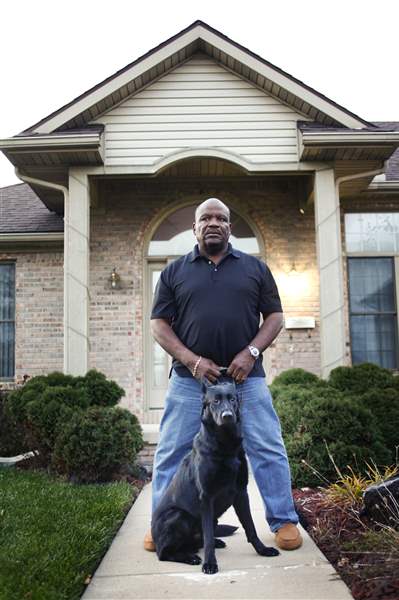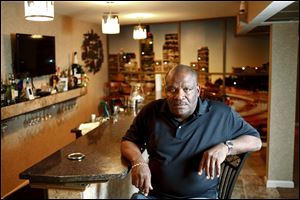
Toledo Marine keeps honors in perspective
Ex-UT player awarded Navy Cross after Vietnam
11/11/2013
Mel Long, with dog, Max, at home in Toledo, was awarded the Navy Cross for his actions at Quang Tin Province, Vietnam.
THE BLADE/JEFFREY SMITH
Buy This Image

Mel Long, with dog, Max, at home in Toledo, was awarded the Navy Cross for his actions at Quang Tin Province, Vietnam.
He’s best known for being one of the key players on the University of Toledo’s football team from 1969-71, which is still regarded as one of the most successful teams in college football history.
He played professionally as a linebacker for the Cleveland Browns for three years. In 1994, he became the first, and still only, University of Toledo player to be inducted into the College Football Hall of Fame.
But to Mel Long’s closest friends, it wasn’t his accomplishments on the gridiron but the bravery and courage he showed as a U.S. Marine fighting in the jungles of Vietnam that make him a true American hero.
“Melvin has always been very humble about his accomplishments,” said Ismael Ortiz, a longtime friend and fellow U.S. Marine who served the same period during the Vietnam War.
“He’s a big hero to me,” said Mr. Ortiz, a Toledo resident. “There’s a lot of Melvins out there in Toledo and people should go out there and find them.”
There may be many Vietnam veterans “out there” — who along with other veterans are being honored today for Veterans Day — but few are as decorated and highly regarded as Mr. Long.
Among the many awards and medals that he has received is the Navy Cross, the second-highest honor that can be awarded to a Marine. He’s also received a Purple Heart, a Bronze Star, and many others.
Mr. Long, 66, said he never made a big deal out of receiving the awards because the grim realities of war and racism, discrimination, and poverty back home in Toledo where his five brothers, five sisters, and parents were living kept everything in perspective.
“When I received the Navy Cross, I never told my mom because she wouldn’t have understood what it was for,” he said. “When you’re fighting a war, there’s a lot of good friends that you lose that don’t make it back.
“There’s a part of your heart that doesn’t make it back.”
The Navy Cross
Sergeant Long was presented the Navy Cross during a 1968 ceremony at the Basic School, Quantico, a U.S. Marine Corps installation located near Triangle, Va. The medal is only given to those who have distinguished themselves by extraordinary heroism in military operations against an armed enemy.
According to the citation presented to him, Sergeant Long earned the decoration on June 2, 1967, in Vietnam, while serving as second squad leader, 3rd Platoon, Company F, 2nd Battalion, 5th Marines, 1st Marine Division, Fleet Marine Force. The incident occurred in the Quang Tin Province, Republic of Vietnam, during Operation Union II.
The platoon came under intense enemy fire and was temporarily pinned down. Despite the unrelenting attack, Sergeant Long led his squad slightly more than the length of two football fields of open, fire-swept terrain into the tree line.
“With complete disregard for his own safety, he maneuvered his squad in an enveloping movement and assaulted the well-entrenched enemy position from the rear, resulting in six enemy killed,” according to the award citation. “Though painfully wounded, he led his men in overrunning the position and organized a hasty defense.
“From his newly won position, he observed another enemy machine gun position which was delivering accurate fire on the platoon. With complete disregard for his wounds and the intense enemy fire, he led another assault which resulted in two more enemy killed.”
After defending the key terrain for three hours, the enemy withdrew and Sergeant Long led his men to a landing zone more than one-third mile away to the rear and supervised the evacuation of the wounded, according to military records.
During the same battle, his commander, Capt. James Graham, was killed on the other side of the battlefield, Mr. Long recalls. Captain Graham received a posthumous Medal of Honor, according to military records.
Mr. Long downplays the harrowing battle that almost took his life. His wounds weren’t “life-threatening,” there was just a lot of shrapnel in his upper arm, Mr. Long recalls.
“It’s just like a job. You get used to it,” he said. “We would go out every day and get shot at.
“I had some great guys to work with who looked out for each other.”

Mel Long relaxes in his home not far from the football practice field of his alma mater, Macomber. Few people know about him as a decorated former Marine.
The draft
That’s not to say Mr. Long ever looked forward to going to fight in Vietnam.
He was an outstanding end on defense and a tight end on offense at the former Macomber High School, from which he graduated in 1964. Within a few months, a military draft letter arrived.
The young man appealed to the local draft board and asked to be excused from service. His request was denied.
“They said, ‘Uncle Sam Wants You!’ ” he says before breaking into laughter. Not one to easily give up, Mr. Long instead requested to be allowed to serve in the U.S. Marines, which bought him a couple of months before having to report for duty.
Like many veterans of that era, Mr. Long doesn’t talk much about his experience in Vietnam.
“That was such an ugly chapter in history,” said Mr. Ortiz, a corporal who served in the U.S. Marine Corps from 1966-72. “Nobody liked us. We were very unpopular.
“When we got home, you almost wanted to deny it, unless you were among other veterans.”
That’s how the two men bonded and became lifelong friends, they agree.
“We enjoy talking about Vietnam,” Mr. Ortiz said. “It’s something only we can understand.
“We’re both still surprised as hell that we survived the war.”
Hero talk
For veterans such as Mr. Long and Mr. Ortiz, Veterans Day “is a good time to reflect on the friends you served with and reflect on the good and bad times,” Mr. Ortiz said.
After being discharged in 1968, Mr. Long returned to Toledo and earned a spot on the University of Toledo Rockets football team that would go on to win 35 straight games and three straight Mid-American Conference titles from 1969-71. Mr. Long believes playing football helped his transition back to civilian life.
“I think it helped — of course we didn’t know we had things like post-traumatic stress back then,” he said. “War is a hostile environment all the time and football is a hostile environment sometimes.”
Mr. Long is proud of many things, including all the men he fought alongside during the war. He’s thankful because the service gave him the courage to never give up. “Sometimes you have to adjust or improvise, but you don’t just quit,” he said.
But he’ll never think of himself as an American hero.
“All that talk about ‘fighting for your country’ is over-rated,” said Mr. Long, who has worked at the Toledo Refinery since 1981 as a gasoline blender. “When you’re in a war, you’re fighting for one thing — your own rear end.
“Collectively, maybe you’re fighting for the country. But you’re really just trying to help keep each other alive.”
That’s why he always took the awards and recognition in stride, he said. He served his country by giving his best effort; he’s proud of that. But it’s all about perspective.
“My best day of my life during my time in service was my last day; the day I was leaving,” Mr. Long said. “I didn’t want to be there in the first place.
“There were some bad days. A lot of friends died; when you see combat for 13 months, there’s going to be some bad days.”
That doesn’t change how he feels about Veterans Day.
“This is a day to give back to those who have served this country, even if they didn’t see combat,” he said. “It may not be the greatest place to live, there may still be a lot of problems like discrimination, but there’s worse places.”
Contact Federico Martinez at: fmartinez@theblade.com or 419-724-6154.